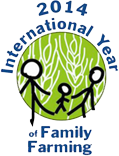FAO sends message on the global need for agroecology

UN Food and Agriculture Organization (FAO) Secretary General, Jose Graziano da Silva, reminded the audience during his closing remarks at the FAO’s Symposium on Agroecology for Food Security and Nutrition last week in Rome that the organization had been at the center of the Green Revolution. They had sent Norman Borlaug, the initiatives’ “father” and Nobel Laureate, from Mexico to India as an FAO consultant, launching new wheat varieties.
I sat in the auditorium last week and thought to myself, “But this is a different era.”
Today, the scientists, NGOs, social movement leaders, and (some!) farmers at the conference are at the center of an agroecological revolution. It may be time for the FAO to catch up.
Social movements are pushing for a change in the dominant model of agricultural production. Latin America and Brazil in particular, as the second largest producer of soy, is where the movement is strongest.
Oxfam has posted previous blogs on agroecology as well as written reports about it, highlighting its benefits and calling for greater investment. Given that it is estimated that a quarter of the world’s land is degraded, and poor men and women inhabit these areas, the wide application of agroecological practices such as agroforestry is a no brainer. Because the FAO meeting was heavily focused on the science of agroecology, this conference will hopefully help debunk the myths that beleaguer the movement.
A lot of agronomists have a hard time recognizing farmers as scientists, preferring to work in a linear way; they develop the solution and pass it on to the farmer. Tom Wakeford of Conventry University distinguished science as a form of inquiry from scientism, an omnipotence that scientists always know best. There is certainly a lot of that, which results in a one-size-fits-all approach, when it comes to agricultural research.
But thousands of farmers across the globe have been practicing agroecology, learning from each other, and partnering with those scientists who don’t elevate scientism. In fact, scientists who support agroecology sent a letter to FAO, praising the organization for holding this meeting and calling it to do more.
The science on agroecology and the need for it discussed at the meeting was certainly compelling:
- The International Center for Research in Agroforestry’s Dr Ravi Prabhu, who is also Deputy Director General of Research at the World Agroforestry Centre, provided evidence on how the right trees, in the right arrangement, at the right location yields tremendous benefits in terms of improved soil fertility, food and income.
- There was evidence on how traditional agronomic science has not paid much attention to the dirty stuff: the soil, the underground biodiversity needed to grow crops. No soil. No life. Agroecological practices focused on increasing biomass production enhance soil biology for the long term.
- Soil scientist Irene Cardoso of the Universidade Federal de Viçosa, Associação Brasileira de Agroecologia, and Centro de Tecnologias Alternatives – Zona da Mata said that the average person in Brazil consumes 5 litres of pesticides annually! A shocking statistic demonstrating the contradictions of the co-existence of agroecology and agribusiness.
Obviously, changing the current agricultural system will take time. Budgets for agricultural research in many parts of the world are tiny, never mind budget line for agroecological research. One presenter at the conference highlighted that in France there is one agricultural researcher per 100 producers. In West Africa, there is one researcher for 100,000 farmers!
I would also like to see more research on the ecological and social aspects of farming, particularly gender-related issues. Most researchers and practitioners gave the usual accolades on how essential women were in food production, but I didn’t hear on how labour constraints, care economy, and fostering women’s leadership were being addressed.
This conference was a bold step first step for FAO. It will organize a number of regional workshops on agroecology. It cannot lose courage as it has the support of citizens and social movements who are demanding a more sustainable food system.
Photo credit: Rebecca Blackwell/Oxfam America
-----------------------
FAO is a key partner in GFAR. The six key pillars of system change in the Global Forum’s Medium Term Plan (improved foresight, partnerships for impact, transformative investments, capacities for change and accountability for research actions) are highly relevant to the delivery of FAO objectives.



